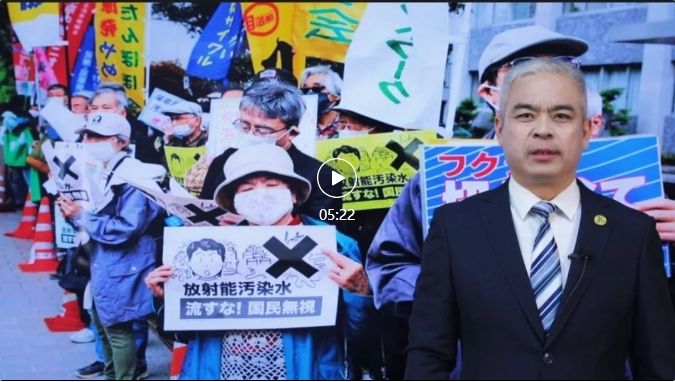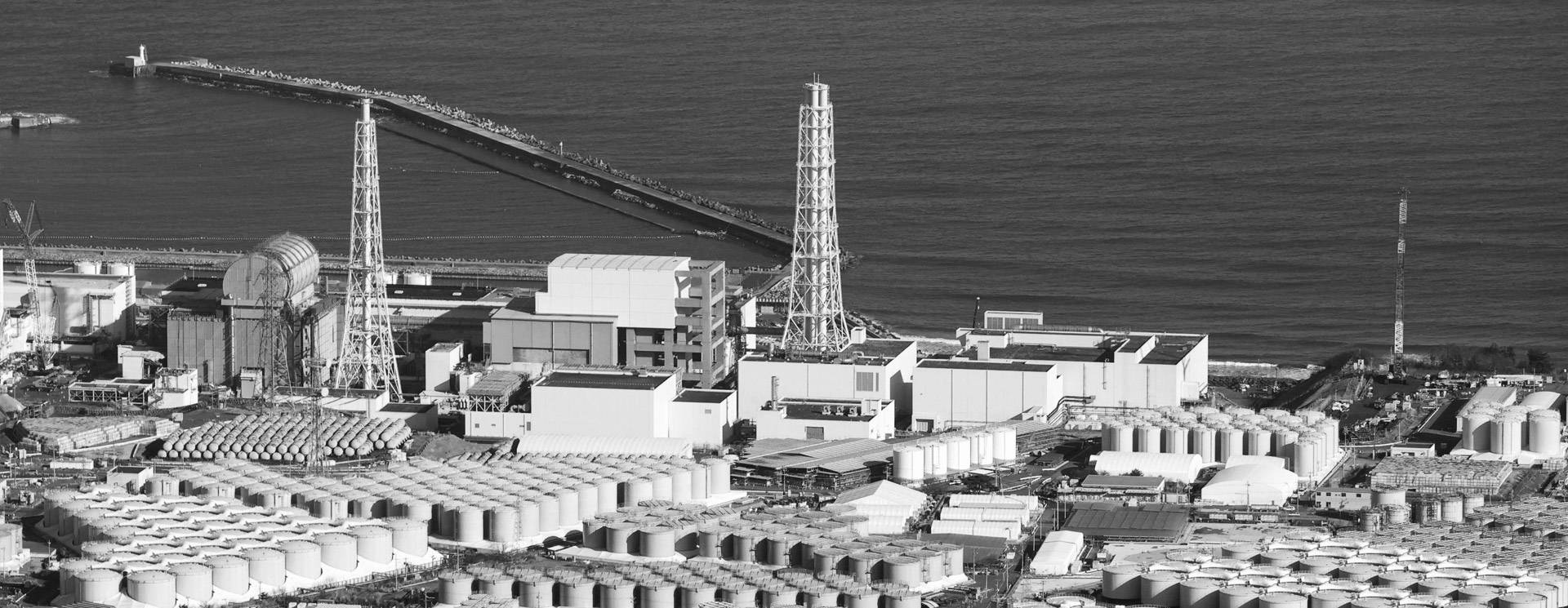
Video link:https://mp.weixin.qq.com/s/qJS1yKmk8V2n9MchhuDcSg
据悉,当时日本全国还有约30起类似的集体赔偿诉讼和对前东京电力公司责任人的刑事诉讼。
本以为针对东京电力公司和日本政府的诉讼会一直聚焦在东日本大地震中,东京电力公司和日本政府的应对策略是否存在过失,但在核事故发生12年后的2023年8月24日,日本政府罔顾周边国家的强烈反对与谴责和国际社会的关切,仍一意孤行将福岛核污染水排放入海。
日本政府批准东京电力公司启动核污染水排海的行为遭到了日本国民的强烈反对,并因此起诉日本政府和东京电力公司,要求停止核污染水排海的行为。
2023年9月8日,日本福岛县、宫城县等地约150名民众以核污染水排海侵害了市民安宁生活的权利,以及令渔业相关人员生计恢复变得困难为由向福岛地方法院提起诉讼,起诉日本政府和东京电力公司,并请求法院判令被告停止将福岛第一核电站核污染水排放入海。2个月后,原告人数翻番约超300人,并第二次提起诉讼,控诉政府的排海决定是非法的。这是日本国内针对核污染水排海的首个诉讼。
2024年4月24日,反对福岛第一核电站核污染水排海的日本民间团体(包括福岛县和平论坛、原子力资料情报室和禁止原子弹氢弹日本国民会议),向经济产业省递交了致首相岸田文雄的民众署名请愿书。该请愿书共有184712名日本民众签署,要求停止核污染水排海。发起本次署名活动的团体相关代表当天在位于东京的众议院第2议员会馆向经济产业省工作人员递交了请愿书,并表示核污染水排海,是强迫核事故受害者作出牺牲,因此要求对核污染水的处理方式重新进行审视。
而目前日本规模最大的,要求停止核污染水排海的原告团已有超过360名民众参与,他们要求日本政府和东京电力公司立即停止这种贻害全球海洋环境和人类健康的行为。
此外,日本国内各地以及境外的诉讼后援团成员已超过了200人,并且还在持续增加。后援团希望反对核污染水排海的声音能够得到持续关注。
虽然东京电力公司一直声称经过ALPS处理后的核污染水是安全的,不会对环境和人类健康造成伤害,但东京电力公司多年一直存在弄虚作假、信息瞒报、内部管理混乱等恶劣行为。
截至目前,福岛核污染水排海已结束四轮,第五轮也于4月19日正式启动,排放入海的核污染水也将接近4万吨。而核污染水排海史无前例,造成的影响也远远超出日本本国领土、领海的管辖范围,核污染水的危害即将蔓延全球。
面对大量的核污染水排海行为,不止是日本国内民众提出反对的声音和发起公益诉讼,国际上也应为日本民众发出声援,也是为保护海洋环境和我们赖以生存的地球发声,更是为保护人类健康、保护我们自己发声。
绿色江南认为,日本民众合理的诉求和反对的声音理应得到尊重,日本民众的诉讼也理应得到我们的响应和支持。
绿色江南也再次呼吁日本政府能够严肃对待国内外强烈反对的声音,停止核污染水排海,并切实妥善处理福岛核污染水。
绿色江南将持续关注福岛核污染水排海进展。
Support the Japanese people to file a public interest lawsuit against discharging the nuclear-contaminated water into the sea
The first public interest lawsuit against the Fukushima Daiichi Nuclear Power Plant for discharging nuclear-contaminated water into the sea can be traced back to September 2013, and the plaintiffs (137 residents who originally lived in the evacuation instruction area and those who evacuated on their own outside the area), wanted the defendants (Tokyo Electric Power Company (TEPCO) of Japan and the Japanese government) to pay compensation for moral damages. Eventually, the Maebashi District Court in Gunma Prefecture, Japan, ruled in March 2017 that the defendants should compensate the plaintiffs 38.55 million yen, or about 2.26 million yuan.
At that time, it was reported that there were about 30 other similar class-action compensation lawsuits and criminal proceedings against the former officials of TEPCO across Japan.
It was expected that the lawsuits against TEPCO and the Japanese government would have been focused on whether there was negligence in their response strategies to the Great East Japan Earthquake, but on August 24, 2023, 12 years after the nuclear accident, the Japanese government, in defiance of the strong opposition and condemnation from neighboring countries as well as the concerns of the international community, was still bent on discharging Fukushima’s nuclear-contaminated water into the sea.
The Japanese government’s approval of TEPCO to start the discharge of nuclear-contaminated water into the sea has been strongly opposed by Japanese nationals, and as a result, they are suing the Japanese government and TEPCO to stop the discharge of nuclear-contaminated water into the sea.
On September 8, 2023, about 150 people from Fukushima Prefecture, Miyagi Prefecture and other places in Japan filed a lawsuit against the Japanese government and TEPCO at the Fukushima District Court on the grounds that the discharge of nuclear-contaminated water into the sea infringed citizens’ right to a peaceful life and made it difficult to restore the livelihoods of fishery-related personnel, and they requested the court to order the defendants to stop discharging nuclear-contaminated water from the Fukushima Daiichi Nuclear Power Plant into the sea. Two months later, the number of plaintiffs doubled to over 300, and a second lawsuit was filed, charging that the government’s decision to discharge nuclear-contaminated water into the sea was illegal. This is the first lawsuit in Japan against the discharge of nuclear-contaminated water into the sea.
On April 24, 2024, Japanese civic groups opposing the discharge of nuclear-contaminated water from the Fukushima Daiichi Nuclear Power Plant into the sea (including the Fukushima Prefectural Peace Forum, Citizens’ Nuclear Information Center, and the Japan National Council for the Prohibition of Atomic and Hydrogen Bombs), submitted a popularly signed petition to Prime Minister Fumio Kishida to the Ministry of Economy, Trade and Industry. The petition, signed by a total of 184,712 Japanese people, calls for a halt to the discharge of nuclear-contaminated water into the sea. Representatives of the group that initiated the signing petition presented a petition to the Ministry of Economy, Trade and Industry at the Second House of Representatives Hall in Tokyo on the same day, calling for a review of the treatment of nuclear-contaminated water, saying that discharging nuclear-contaminated water into the sea is forcing the victims of the nuclear accident to make sacrifices.
The largest plaintiff group in Japan to demand a halt to the discharge of nuclear-contaminated water into the sea has been joined by more than 360 people at present, who are demanding that the Japanese government and TEPCO immediately stop this behavior, which is detrimental to the global marine environment and human health.
In addition, the number of the support group for the litigation in Japan and abroad has exceeded 200 and continues to grow. The support group hopes that the voices against the discharge of nuclear-contaminated water into the sea will receive continued attention.
Although TEPCO has always claimed that nuclear-contaminated water treated by ALPS is safe and will not harm the environment and human health, TEPCO has been engaging in such egregious behaviors as falsification, concealment of information, and chaotic internal management for many years.
Up to now, four rounds of Fukushima nuclear-contaminated water have been discharged into the sea, and the fifth round was officially launched on April 19, and the nuclear-contaminated water discharged into the sea will be close to 40,000 tons. The discharge of nuclear-contaminated water into the sea is unprecedented, and the impact is far beyond the jurisdiction of Japan’s own territory and territorial sea, and the harm of nuclear-contaminated water will spread around the world.
In the face of a large number of nuclear-contaminated water discharged into the sea, not only the Japanese people should raise opposition voices and launch public interest lawsuits, but also the international community should express their solidarity with the Japanese people, which is also for the protection of the marine environment and the earth on which we rely for survival, and more importantly, for the protection of human health.
Lvse Jiangnan believes that the reasonable demands and opposition voices of the Japanese people should be respected, and the lawsuits of the Japanese people should also receive our response and support.
Lvse Jiangnan also once again calls on the Japanese government to take the strong opposition voices at home and abroad seriously, to stop the discharge of nuclear-contaminated water into the sea, and to treat the Fukushima nuclear-contaminated water effectively and properly.
Lvse Jiangnan will continue to pay attention to the progress of the discharge of the Fukushima nuclear-contaminated water.
原子力汚染水の海洋放出に関する日本国民の公益訴訟を支援する
福島第一原子力発電所の汚染水海洋流出に対する公益訴訟は、早ければ2013年9月に遡れます。原告(避難指示区域に住んでいた住民137名と区域外に自主避難した住民137名)は、被告(東京電力と日本政府)に対して損害賠償を求めました。結局、群馬県の前橋地方裁判所は2017年3月、被告が原告に対して3855万円(約226万元)を賠償すべきとの判決を下しました。
当時、旧東京電力(TEPCO)の責任者に対する同様の集団賠償訴訟や刑事訴訟は、日本全国に約30件あると報じられていました。
東京電力と日本政府に対する訴訟は、東日本大震災と、その対応戦略における東京電力と日本政府の過失の有無に焦点が当てられると予想されていましたが、原発事故から12年後の2023年8月24日、日本政府は近隣諸国の強い反対と非難、そして国際社会の懸念を無視して、福島の汚染水を海に流しました。
日本政府が東京電力による原子力汚染水の海洋放出開始を容認したことに対し、日本国民は強く反発し、原子力汚染水の海洋放出を止めるよう日本政府と東京電力を提訴しました。
2023年9月8日、福島県と宮城県の約150人が、汚染水の海洋放出は国民の平和的生存権を侵害し、漁業関係者の生活再建を困難にしたとして、福島地方裁判所に提訴しました。国と東京電力を相手取り、原子力汚染水の海洋放出の差し止めを求める訴訟が提起されました。その2カ月後、原告は300人を超え、国の海洋放出決定は違法として第2回の訴訟が提起されました。これは、原子力汚染水の海洋放出に対する日本初の訴訟です。
原発汚染水の海洋放出を止める日本最大の原告団に360人以上が加わり、日本政府と東京電力に対し、地球規模の海洋環境と人間の健康に有害な行動を直ちに止めるよう要求しています。
2024年4月24日、福島第一原子力発電所からの原子力汚染水の海洋放出に反対する日本の市民団体(福島県平和フォーラム、原子力資料情報室、原水爆禁止日本国民会議など)は、岸田文雄首相宛ての署名入りの国民請願書を経済産業省に提出しました。この署名簿には、原子力汚染水の海洋放出中止を求める184,712人の署名が寄せられました。署名運動を始めた団体の代表は同日、東京の衆議院第2議員会館で経産省職員に署名簿を提出し、「原子力汚染水の海洋放出は原発事故の被害者に犠牲を強いている」として、汚染水の処理を再検討するよう求めました。
また、国内外の「訴訟を支援する会」の会員数は200人を超え、現在も増え続けています。 原発汚染水の海洋放出に反対する声が、今後とも注目されることを希望しています。
東京電力はこれまで、ALPSで処理された核汚染水は安全で、環境や人体に害を及ぼすことはないと主張していますが、改ざん、情報隠蔽、混乱した内部管理など、東京電力は長年にわたり、このような嘆かわしい行為を行ってきました。
現在までに4回の福島原発汚染水放流が終了し、4月19日には正式に5回目の放流が開始され、4万トン近い原子力汚染水が海に放出されました。核汚染水の海洋放出は前代未聞で、その影響は日本固有の領土・領海をはるかに超え、核汚染水の危険性は世界的な広がりを見せようとしています。
核汚染水の大量海洋放出を前にして、反対の声を上げ、公益訴訟を起こしたのは、日本国民だけでなく、国際レベルで連帯すべき人々です。これは、海洋環境と私たちが依存している地球を守るための声でもありますし、人間の健康と私たち自身を守るための声でもあります。
グリーン江南は、日本国民の合理的な要求と反対の声は尊重されるべきで、日本国民の訴訟は私たちの応答と応援を受けるべきだと信じています。
グリーン江南はまた、日本政府に対し、国内外の強い反対を真摯に受け止め、原子力汚染水の海洋放出を中止し、福島原発の汚染水を適切に処理するよう改めて求めます。
グリーン江南は、今後も福島原発の汚染水海洋放出を注視していきます。
Content source: Lvse Jiangnan WeChat public account
